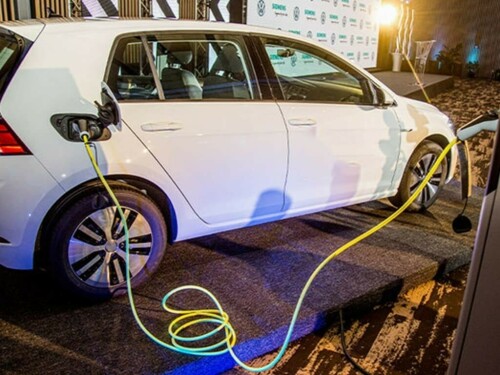Government Unveils National Electric Vehicle Policy 2025-30
The federal government, through the Ministry of Industries and Production, has officially inaugurated the National Electric Vehicle (NEV) Policy 2025-30 on Thursday.
Speaking at the event, the Special Assistant to the Prime Minister on Industries and Production, Haroon Akhtar Khan, hailed the policy as a “monumental and game-changing initiative” in Pakistan’s advancement towards reforms in industry, environment, and energy sectors.
Haroon Akhtar Khan emphasized that the freshly introduced EV policy is in line with the Prime Minister’s objective to encourage environmentally friendly, sustainable, and economical transportation while bolstering local industries and safeguarding the environment.
He pointed out that the transportation sector significantly contributes to carbon emissions within Pakistan, necessitating crucial reforms.
Key Objectives and Projections
A primary goal of the policy is to ensure that electric vehicles constitute 30% of all new vehicle sales in Pakistan by the year 2030.
This shift is anticipated to conserve 2.07 billion litres of fuel annually, translating to approximately USD 1 billion in savings on foreign exchange.
The policy is also projected to curtail carbon emissions by 4.5 million tons and decrease healthcare expenditures by USD 405 million each year.
Subsidies and Digital Platform
Akhtar revealed an initial subsidy of Rs. 9 billion earmarked for the fiscal year 2025-26, which will support 116,053 electric bikes and 3,171 electric rickshaws.
- Notably, 25% of this subsidy is specifically allocated for women, aiming to provide them with secure, cost-effective, and environmentally sound mobility options.
He mentioned the introduction of a comprehensive digital platform designed for transparent online application, verification, and subsidy distribution.
Infrastructure and Manufacturing Incentives
The policy incorporates the installation of 40 new EV charging stations along motorways, spaced approximately 105 kilometres apart.
It also promotes the adoption of battery swapping systems, vehicle-to-grid (V2G) schemes, and the mandatory inclusion of EV charging points in new building regulations to facilitate broader adoption in urban settings.
To stimulate local manufacturing, incentives are being offered to domestic producers, given that over 90% of components for two- and three-wheeled vehicles are already manufactured locally.
The government intends to roll out targeted support packages for small and medium enterprises (SMEs) to further enhance localisation. The AIDEP tariff facility will remain effective until 2026, with a gradual phase-out planned by 2030.
Consultation and Review Mechanisms
The Special Assistant highlighted that the policy was formulated through discussions involving more than 60 experts, institutions, and industry participants, guided by a steering committee under the Ministry of Industries and Production starting in September 2024.
The steering committee is set to conduct monthly and quarterly reviews, while the Auditor General of Pakistan will perform performance audits every six months.
Vision for the Future
He emphasised that the NEV Policy 2025-30 signifies not just an environmental advancement but also a framework for industrial development, domestic job creation, energy efficiency, and technological independence in Pakistan.
He voiced optimism that federal and provincial governments, the private sector, and the public would collaborate to achieve this vision of a clean, modern, and sustainable transport infrastructure.
Akhtar asserted that the policy is a decisive step towards clean energy, sustainable transportation solutions, and industrial progress. It introduces a thorough and results-oriented plan designed to steer Pakistan towards an environmentally cleaner and more robust future.
He also noted that domestically manufactured goods are priced 30-40% lower than imported alternatives, with local production accounting for over 90% of parts in the two-wheeler sector.
Acknowledging Pakistan’s vulnerability to climate change, the EV policy is expected to make considerable contributions towards attaining global carbon reduction goals.
The policy is anticipated to yield savings of around Rs. 800 billion over the next 24-25 years through reduced fuel imports, the utilization of affordable electricity, and revenue generation from carbon credits.
Switching to electric vehicle charging will also lower capacity payments from Rs174 billion to Rs105 billion, while carbon credits could potentially generate approximately Rs15 billion in revenue.
The nation’s total energy demand for EVs in the coming five years is projected to be 126 terawatt-hours, a demand that can be accommodated using the existing surplus in the national grid.
Users of electric rickshaws or bikes are expected to recoup their initial investment within 1 year and 10 months, thanks to the reduced charging costs relative to petrol.
For example, the additional cost of an electric bike, estimated at Rs. 150,000, can be recovered in under two years through fuel savings.
He concluded by stating that the government has also introduced exemptions on customs duties and sales tax on EV parts to support the local industry.
“This policy should be fully embraced by Pakistan, as it represents a transformative change for our economy, environment, and industrial sector,” Akhtar affirmed.



Comments (0)
No comments yet. Be the first to comment!
Leave a Comment